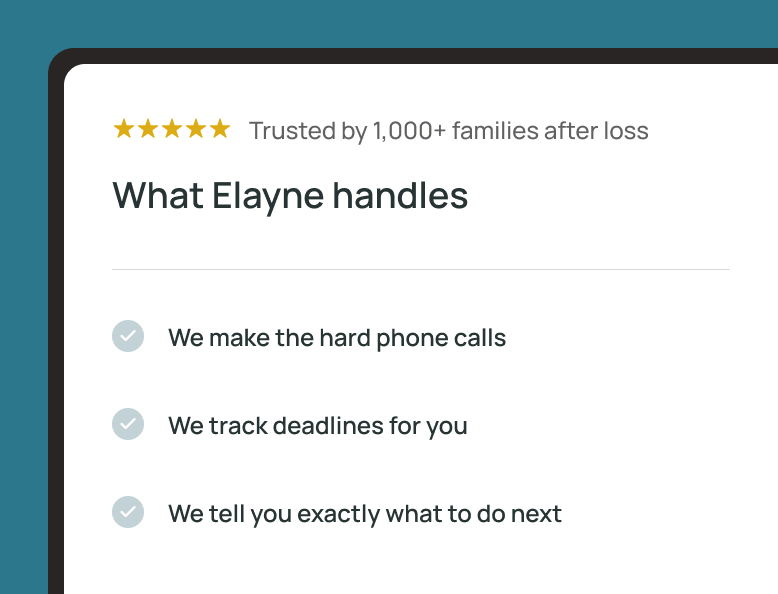When someone passes away, their family becomes responsible for certain legal tasks. Of them all, the most complicated is often probate.
Probate is a court process that determines how assets are distributed, debts are paid, and the estate is formally closed. Some families enter probate after a loss with no planning at all. Others have already taken steps to prepare. But in both cases, the structure of the estate—how accounts were titled, whether a will exists, and what documents are in place—shapes what happens next.
Below, we break down what probate involves, when it’s required, and how families can reduce the burden it creates. Please keep in mind, this article is for informational purposes only and isn’t legal, medical, financial or tax advice.
If you have authority to act, our goal is to give you a clear starting point, and help you work more effectively with the professionals who guide you through the process.
Understanding Probate After Someone Dies: The Basics
Probate is the legal system’s way of making sure that a person’s assets are transferred and debts are paid after their death. It ensures that everything is handled according to the law, protects the person’s wishes, and honors the rights of their heirs and creditors.
If there’s a valid will: the court appoints the executor named in that document to manage the estate.
If there is no will: the court selects someone else, usually a spouse or close family member. That person must gather records, inventory the estate, settle debts and taxes, and distribute what remains to the right people.
Some probates are fairly simple. Others are delayed by missing documents, disagreements among heirs, or assets that span multiple states or types. Knowing what causes those complications helps families plan better from the start.
Navigating Probate After Someone Dies
Many people first learn about probate in the days or weeks after someone passes away. It often shows up without warning, triggered by a frozen account, property that can’t be transferred, or a request for documents.
If that happens, the most important thing is to take it step by step.
Start by locating key documents, such as the will, trust, or any account statements. Next, reach out to the probate court in your area or speak with a licensed attorney to understand the requirements in your state.
If you’re working with Elayne, we’ll simplify gathering, organizing and preparing the paperwork that professionals need. Our team knows what courts and attorneys typically ask for, and can help families get ahead of those requests before they become urgent. With the right support, even a complicated probate can start to feel more straightforward and under control.
When Is Probate Required After Someone Dies?
In general, probate is required when assets can't legally transfer to someone else without a court’s involvement. This can happen when:
- The deceased person owned assets solely in their name
- No beneficiaries were named on certain accounts or policies
- Property or financial accounts were not jointly owned
- There was no trust in place to hold or transfer assets
Even when there is a will, probate may still be required to give the executor legal authority to act on behalf of the estate. Without this court approval, banks, title companies, and other institutions typically won’t allow account access or property transfers.
Every state has its own rules on probate. That’s why working with a professional is important: they’ll help you understand what laws apply, and what steps are required in your specific situation.
When Probate May Not Be Needed After Someone Dies
Some assets can pass directly to heirs without going through probate, depending on how they’re titled. These are called non-probate assets, and they can significantly reduce the legal workload. Examples include:
- Joint ownership with right of survivorship: When two people own property together, the surviving owner typically receives full ownership automatically.
- Payable-on-death (POD) or transfer-on-death (TOD) accounts: These allow certain assets—like bank accounts, investments, and in some states, real estate—to transfer directly to a named beneficiary.
- Retirement accounts and life insurance policies: If a beneficiary is listed, these assets usually transfer without probate.
- Trust-owned assets: Assets held in a trust typically avoid probate and are distributed according to the trust’s terms.
- Small estate exemptions: Some states offer a simplified process if the total value of the estate falls under a certain limit, making it easier and faster to settle.
Even when probate isn’t required, that doesn’t mean the process is automatic. These transfers still require documentation, and small mistakes—like outdated beneficiaries or unclear titles—can lead to delays or disputes. That’s why early planning, and the right professional guidance, make such a difference.
Steps to Avoid or Reduce Probate
While probate can’t always be avoided, planning can significantly reduce how much of an estate is subject to it. A few of the most effective strategies include:
- Creating a living trust: Assets placed in a trust during your lifetime can be distributed without court involvement. Trusts also offer more privacy than wills, which become public records during probate.
- Joint ownership: Titling property jointly with the right legal structure can help ensure that it transfers directly to the surviving owner. This is common with homes, vehicles, or bank accounts.
- Naming beneficiaries on accounts: Many banks, brokerage firms, and retirement providers allow account holders to name a beneficiary, which lets those funds skip probate.
- Using POD or TOD designations: These options allow certain financial accounts, securities, and even real estate to transfer automatically to designated individuals.
- Keeping your documents updated: Outdated records, missing forms, or mismatched names on accounts can cause serious problems. Review key documents regularly to make sure they reflect your current wishes.
The Role of Professionals
Even with good planning, probate and estate settlement often involve dense paperwork, strict deadlines, and complex legal requirements.
That’s where Elayne comes in. Our Care Managers and app help families gather the right records, organize key documents, and prepare the information that professionals need to move the process forward.
Attorneys, financial advisors, and tax professionals all play a critical role in probate. They interpret the law, manage filings, and resolve any problems that arise. By having the necessary paperwork ready, they can focus more on solving difficult issues, rather than dealing with administrative tasks. As a result, their work becomes faster, more effective, and less expensive.
Why Planning Ahead Matters
In many cases, probate can take months or even years. Also, because probate is generally a matter of public record, many families would prefer to keep these matters private when possible.
Good planning not only helps simplify the legal process, but also reduces stress on loved ones during an already difficult time. Careful preparation ensures that assets are distributed efficiently and that family members aren’t left trying to sort out financial and legal issues while they’re grieving. The more organization there is in advance, the easier the estate process will be.
Moving Forward With Confidence
Probate can feel intimidating when you first encounter it. But like many complex processes, it becomes much simpler to manage once you have a clear understanding of how it works, what’s required, and where to turn for guidance.
Remember, you don’t need to have every answer at the start. What matters is starting with the right information, surrounding yourself with people who can help, and taking things one step at a time.
*Disclaimer: This article is for informational purposes only and does not provide legal, medical, financial, or tax advice. Please consult with a licensed professional to address your specific situation.















































